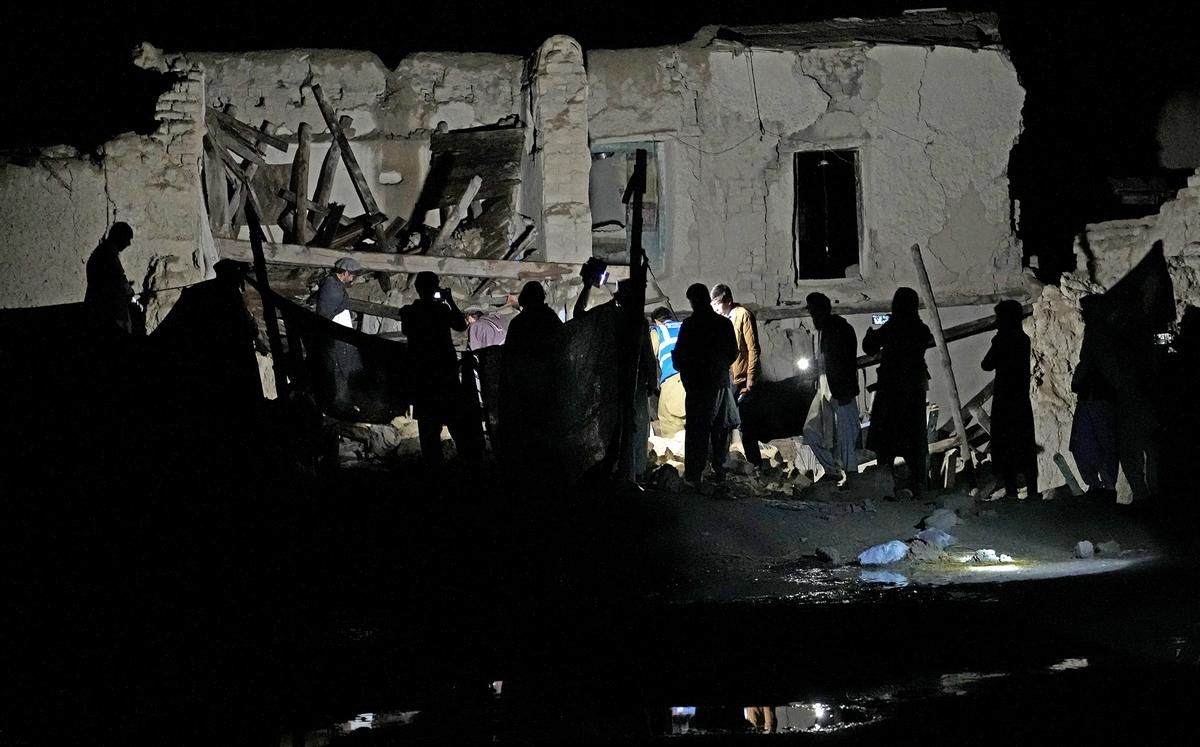Thursday, survivors dug by hand through villages in eastern Afghanistan that were reduced to rubble by a powerful earthquake that killed at least 1,000 people. At the same time, the Taliban and the international community that fled their takeover of the country struggled to assist the victims of the disaster.
Villagers in the Gayan district of the severely damaged Paktika region stood atop the mud bricks that formerly comprised a house in that area. Others picked their way cautiously through muddy passageways, clinging for dear life to broken walls with exposed wood beams as they moved forward.
The earthquake was the worst in Afghanistan in the last two decades, and authorities have suggested that the death toll might increase further. According to a news service sponsored by the state, there were an estimated 1,500 more people who were hurt.
The devastation that was caused by the earthquake of magnitude 6 heaps more misery on a country where millions of people are facing increasing hunger and poverty and where the health system has been deteriorating ever since the Taliban retook power nearly ten months ago in the midst of the withdrawal of the United States and NATO. As a result of the takeover, crucial sources of foreign finance were severed, and the majority of the world has avoided the government of the Taliban.
As rescue workers without heavy equipment delved through the wreckage with their bare hands, the issue of how and if the Taliban would allow the rest of the world to lend assistance remained unanswered.
It took some time before the entire scope of the devastation that had occurred among the towns nestled in the mountains became clear. Landslides caused by recent rains rendered access considerably more difficult than it already was since the roads, which were already rutted and difficult to navigate in the best of conditions, may have been severely damaged.
Considerably if dwellings made of mud and brick can resist earthquakes of magnitude 6 in other parts of the world, the mountains of Afghanistan, which are prone to landslides, make earthquakes of this magnitude even more hazardous.
The evacuation of many foreign assistance organisations from Afghanistan after the Taliban’s takeover of the country in August of last year might provide a challenge to the relief effort, despite the fact that rescuers have rushed in by helicopter. In addition, the majority of nations’ governments are apprehensive of engaging in direct negotiations with the Taliban.
According to Ramiz Alakbarov, the United Nations deputy special representative to Afghanistan, the Taliban had not formally requested that the United Nations mobilise international search-and-rescue teams or obtain equipment from nearby nations to supplement the few dozen ambulances as well as several helicopters sent by Afghan officials. This is a sign of the muddled workings between the Taliban and the rest of the world.
Despite this, representatives from a variety of United Nations organisations said that the Taliban were providing them with unrestricted access to the region.
Zabihullah Mujahid, a spokesperson for the Taliban, announced on Twitter that eight trucks carrying food and other essentials had arrived in Paktika from Pakistan. These vehicles came from Pakistan. Additionally, he said on Thursday that three aircraft carrying humanitarian assistance had arrived in the nation. Two of the planes came from Iran, while the other two came from Qatar.
It may be more challenging to get more direct assistance from overseas sources: In order to prevent money from falling into the hands of the Taliban, a number of nations, notably the United States, channel humanitarian assistance to Afghanistan via the United Nations and other organisations of a similar kind.
According to the Meteorological Department of neighbouring Pakistan, the epicentre of the earthquake occurred in the province of Paktika, which is located around 50 kilometres (31 miles) southwest of the city of Khost. The opinions of specialists place its depth at about 10 kilometres (6 miles). The damage caused by shallow earthquakes is often greater.
The number of fatalities that were reported by the Bakhtar news agency was comparable to those that were caused by an earthquake in the northern part of Afghanistan in the year 2002. Those have been the worst since 1998, when an earthquake of the same magnitude, 6.1, and following tremors in the far northeast killed at least 4,500 people. Those tremors occurred in the northeast.
The earthquake that occurred on Wednesday occurred in an area that is prone to landslides and has a large number of older structures that are weaker.
Men stood atop the remains of a mud dwelling that was located in the Speray area of the adjacent Khost province, which also received significant damage. The earthquake had torn holes in the structure’s wooden timbers. People sat outdoors behind an improvised tent fashioned of a blanket that flapped in the wind.
Those who survived the attack moved immediately to prepare the bodies of the deceased from the district, which included children and an infant, for burial. The authorities are concerned that other bodies may be discovered in the following days.
